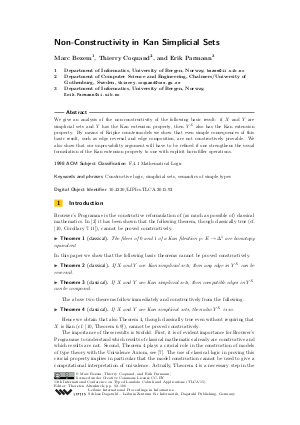Non-Constructivity in Kan Simplicial Sets
Authors Marc Bezem, Thierry Coquand, Erik Parmann
-
Part of:
Volume:
13th International Conference on Typed Lambda Calculi and Applications (TLCA 2015)
Part of: Series: Leibniz International Proceedings in Informatics (LIPIcs)
Part of: Conference: International Conference on Typed Lambda Calculi and Applications (TLCA) - License:
 Creative Commons Attribution 3.0 Unported license
Creative Commons Attribution 3.0 Unported license
- Publication Date: 2015-06-15
File

PDF
LIPIcs.TLCA.2015.92.pdf
- Filesize: 0.48 MB
- 15 pages
Document Identifiers
Subject Classification
Keywords
- Constructive logic
- simplicial sets
- semantics of simple types
Metrics
- Access Statistics
-
Total Accesses (updated on a weekly basis)
0Document
0Metadata
Abstract
We give an analysis of the non-constructivity of the following basic result: if X and Y are simplicial sets and Y has the Kan extension property, then Y^X also has the Kan extension property. By means of Kripke countermodels we show that even simple consequences of this basic result, such as edge reversal and edge composition, are not constructively provable. We also show that our unprovability argument will have to be refined if one strengthens the usual formulation of the Kan extension property to one with explicit horn-filler operations.
Cite As Get BibTex
Marc Bezem, Thierry Coquand, and Erik Parmann. Non-Constructivity in Kan Simplicial Sets. In 13th International Conference on Typed Lambda Calculi and Applications (TLCA 2015). Leibniz International Proceedings in Informatics (LIPIcs), Volume 38, pp. 92-106, Schloss Dagstuhl – Leibniz-Zentrum für Informatik (2015)
https://doi.org/10.4230/LIPIcs.TLCA.2015.92
BibTex
@InProceedings{bezem_et_al:LIPIcs.TLCA.2015.92,
author = {Bezem, Marc and Coquand, Thierry and Parmann, Erik},
title = {{Non-Constructivity in Kan Simplicial Sets}},
booktitle = {13th International Conference on Typed Lambda Calculi and Applications (TLCA 2015)},
pages = {92--106},
series = {Leibniz International Proceedings in Informatics (LIPIcs)},
ISBN = {978-3-939897-87-3},
ISSN = {1868-8969},
year = {2015},
volume = {38},
editor = {Altenkirch, Thorsten},
publisher = {Schloss Dagstuhl -- Leibniz-Zentrum f{\"u}r Informatik},
address = {Dagstuhl, Germany},
URL = {https://drops.dagstuhl.de/entities/document/10.4230/LIPIcs.TLCA.2015.92},
URN = {urn:nbn:de:0030-drops-51579},
doi = {10.4230/LIPIcs.TLCA.2015.92},
annote = {Keywords: Constructive logic, simplicial sets, semantics of simple types}
}
Author Details
References
-
Steve Awodey and Michael Warren. Homotopy theoretic models of identity types. Mathematical Proceedings of the Cambridge Philosophical Society, 146:45-55, 2009.

-
Marc Bezem and Thierry Coquand. A Kripke model for simplicial sets. TCS, 2015. doi:10.1016/j.tcs.2015.01.035.

- Greg Friedman. An elementary illustrated introduction to simplicial sets. Preprint, http://arxiv.org/abs/0809.4221, 2008.
-
Peter Gabriel and Michel Zisman. Calculus of fractions and homotopy theory. Springer, 1967.

-
Paul Goerss and J.F. Jardine. Simplicial Homotopy Theory. Modern Birkhäuser Classics. Birkhauser Verlag GmbH, 2009. Reprint of Vol. 174 of Progress in Mathematics, 1999.

-
Martin Hofmann. Syntax and semantics of dependent types. In A.M. Pitts and P. Dybjer, editors, Semantics and logics of computation, volume 14 of Publ. Newton Inst., pages 79-130. Cambridge University Press, Cambridge, 1997.

- Chris Kapulkin, Peter LeFanu Lumsdaine, and Vladimir Voevodsky. The simplicial model of univalent foundations. Preprint, http://arxiv.org/abs/1211.2851, 2012.
-
Saul Kripke. Semantical analysis of intuitionistic logic I. In M. Dummett and J.N. Crossley, editors, Formal Systems and Recursive Functions, pages 92-130. North-Holland, Amsterdam, 1965.

-
Bob Lubarsky, March 2015. Personal communication.

-
Jon Peter May. Simplicial Objects in Algebraic Topology. Chicago Lectures in Mathematics. University of Chicago Press, 2nd edition, 1993.

-
Charles McCarty. Two questions about IZF and intuitionistic validity. Pdf file, personal communication, March 2015.

- John C. Moore. Algebraic homotopy theory. Lectures at Princeton, http://faculty.tcu.edu/gfriedman/notes/aht1.pdf, 1956.
- Thomas Nikolaus. Algebraic models for higher categories. Preprint, http://arxiv.org/abs/1003.1342, 2010.
- Vladimir Voevodsky. Notes on type systems. http://www.math.ias.edu/~vladimir/Site3/Univalent_Foundations_files/expressions_current.pdf, 2009.
